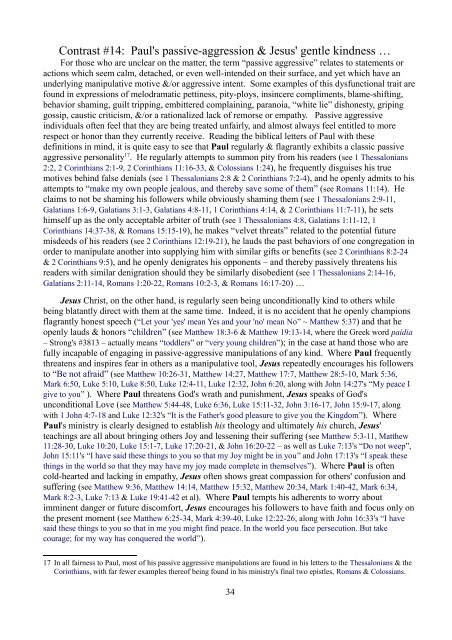The Cult of Paul
an exhaustive biblical examination of the starkly contrasting lives, values, & theologies of Jesus Christ and Paul -- Jesus' most zealous “apostle,” and the true father of the modern-day Christian church
an exhaustive biblical examination of the starkly contrasting lives, values, & theologies of Jesus Christ and Paul -- Jesus' most zealous “apostle,” and the true father of the modern-day Christian church
Create successful ePaper yourself
Turn your PDF publications into a flip-book with our unique Google optimized e-Paper software.
Contrast #14: <strong>Paul</strong>'s passive-aggression & Jesus' gentle kindness …<br />
For those who are unclear on the matter, the term “passive aggressive” relates to statements or<br />
actions which seem calm, detached, or even well-intended on their surface, and yet which have an<br />
underlying manipulative motive &/or aggressive intent. Some examples <strong>of</strong> this dysfunctional trait are<br />
found in expressions <strong>of</strong> melodramatic pettiness, pity-ploys, insincere compliments, blame-shifting,<br />
behavior shaming, guilt tripping, embittered complaining, paranoia, “white lie” dishonesty, griping<br />
gossip, caustic criticism, &/or a rationalized lack <strong>of</strong> remorse or empathy. Passive aggressive<br />
individuals <strong>of</strong>ten feel that they are being treated unfairly, and almost always feel entitled to more<br />
respect or honor than they currently receive. Reading the biblical letters <strong>of</strong> <strong>Paul</strong> with these<br />
definitions in mind, it is quite easy to see that <strong>Paul</strong> regularly & flagrantly exhibits a classic passive<br />
aggressive personality 17 . He regularly attempts to summon pity from his readers (see 1 <strong>The</strong>ssalonians<br />
2:2, 2 Corinthians 2:1-9, 2 Corinthians 11:16-33, & Colossians 1:24), he frequently disguises his true<br />
motives behind false denials (see 1 <strong>The</strong>ssalonians 2:8 & 2 Corinthians 7:2-4), and he openly admits to his<br />
attempts to “make my own people jealous, and thereby save some <strong>of</strong> them” (see Romans 11:14). He<br />
claims to not be shaming his followers while obviously shaming them (see 1 <strong>The</strong>ssalonians 2:9-11,<br />
Galatians 1:6-9, Galatians 3:1-3, Galatians 4:8-11, 1 Corinthians 4:14, & 2 Corinthians 11:7-11), he sets<br />
himself up as the only acceptable arbiter <strong>of</strong> truth (see 1 <strong>The</strong>ssalonians 4:8, Galatians 1:11-12, 1<br />
Corinthians 14:37-38, & Romans 15:15-19), he makes “velvet threats” related to the potential future<br />
misdeeds <strong>of</strong> his readers (see 2 Corinthians 12:19-21), he lauds the past behaviors <strong>of</strong> one congregation in<br />
order to manipulate another into supplying him with similar gifts or benefits (see 2 Corinthians 8:2-24<br />
& 2 Corinthians 9:5), and he openly denigrates his opponents – and thereby passively threatens his<br />
readers with similar denigration should they be similarly disobedient (see 1 <strong>The</strong>ssalonians 2:14-16,<br />
Galatians 2:11-14, Romans 1:20-22, Romans 10:2-3, & Romans 16:17-20) …<br />
Jesus Christ, on the other hand, is regularly seen being unconditionally kind to others while<br />
being blatantly direct with them at the same time. Indeed, it is no accident that he openly champions<br />
flagrantly honest speech (“Let your 'yes' mean Yes and your 'no' mean No” ~ Matthew 5:37) and that he<br />
openly lauds & honors “children” (see Matthew 18:3-6 & Matthew 19:13-14, where the Greek word paidia<br />
– Strong's #3813 – actually means “toddlers” or “very young children”); in the case at hand those who are<br />
fully incapable <strong>of</strong> engaging in passive-aggressive manipulations <strong>of</strong> any kind. Where <strong>Paul</strong> frequently<br />
threatens and inspires fear in others as a manipulative tool, Jesus repeatedly encourages his followers<br />
to “Be not afraid” (see Matthew 10:26-31, Matthew 14:27, Matthew 17:7, Matthew 28:5-10, Mark 5:36,<br />
Mark 6:50, Luke 5:10, Luke 8:50, Luke 12:4-11, Luke 12:32, John 6:20, along with John 14:27's “My peace I<br />
give to you” ). Where <strong>Paul</strong> threatens God's wrath and punishment, Jesus speaks <strong>of</strong> God's<br />
unconditional Love (see Matthew 5:44-48, Luke 6:36, Luke 15:11-32, John 3:16-17, John 15:9-17, along<br />
with 1 John 4:7-18 and Luke 12:32's “It is the Father's good pleasure to give you the Kingdom”). Where<br />
<strong>Paul</strong>'s ministry is clearly designed to establish his theology and ultimately his church, Jesus'<br />
teachings are all about bringing others Joy and lessening their suffering (see Matthew 5:3-11, Matthew<br />
11:28-30, Luke 10:20, Luke 15:1-7, Luke 17:20-21, & John 16:20-22 – as well as Luke 7:13's “Do not weep”,<br />
John 15:11's “I have said these things to you so that my Joy might be in you” and John 17:13's “I speak these<br />
things in the world so that they may have my joy made complete in themselves”). Where <strong>Paul</strong> is <strong>of</strong>ten<br />
cold-hearted and lacking in empathy, Jesus <strong>of</strong>ten shows great compassion for others' confusion and<br />
suffering (see Matthew 9:36, Matthew 14:14, Matthew 15:32, Matthew 20:34, Mark 1:40-42, Mark 6:34,<br />
Mark 8:2-3, Luke 7:13 & Luke 19:41-42 et al). Where <strong>Paul</strong> tempts his adherents to worry about<br />
imminent danger or future discomfort, Jesus encourages his followers to have faith and focus only on<br />
the present moment (see Matthew 6:25-34, Mark 4:39-40, Luke 12:22-26, along with John 16:33's “I have<br />
said these things to you so that in me you might find peace. In the world you face persecution. But take<br />
courage; for my way has conquered the world”).<br />
17 In all fairness to <strong>Paul</strong>, most <strong>of</strong> his passive aggressive manipulations are found in his letters to the <strong>The</strong>ssalonians & the<br />
Corinthians, with far fewer examples there<strong>of</strong> being found in his ministry's final two epistles, Romans & Colossians.<br />
34

















